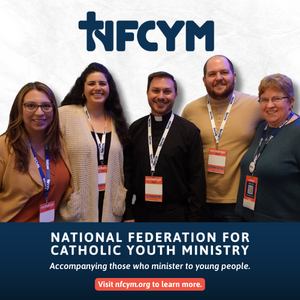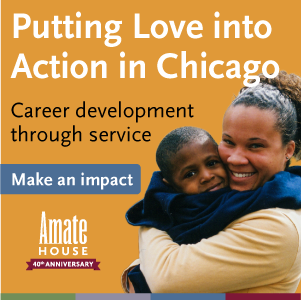Here is another exciting installment of our popular feature, “Where Are They Now?” This series highlights volunteer alumni who carry out the spirit of service in different professions and ministries. In this edition we are getting to know some alumni who have chosen professions in engineering.
Hello! I’m Angela Medlock, and I served with the Colorado Vincentian Volunteers (CVV) in Denver, CO from 2010-2011. I studied civil engineering, and am now a Bridge Inspection Engineer with AECOM.
What inspired you to serve?
After attending both the career fair and the volunteer fair at my college, I knew volunteering was what I wanted to do. Spending a year living in community with a group of strangers, working to help those in poverty, and learning the importance of simple living seemed like the perfect way to kick off adulthood.
What is one memory from your time of service that has stuck with you, and why?
I worked at a homeless day-shelter, and many days I was part of the staff that opened the doors in the morning at 6am. As the guests entered, we would greet and check them in. These short interactions were always my favorite part of the day. It amazed me how cheerful so many of the people were despite having slept on the streets or in shelters the night before. It reminded me that having a positive attitude will help get you through a lot in life. I have never enjoyed going to work as much as I did those days I was opening the shelter.
Has your service experience impacted your career path? If so, how?
A large component of our service year was focused on reflection and discussion. Taking the time to reflect on how I’m serving my clients and co-workers has made me a stronger leader and manager. Another piece of our service year was learning to live in community with others, even people we didn’t see eye to eye with. We would always be encouraged to face problems directly, and have the difficult conversations that we often want to shy away from. This skill set has come in handy both in my personal and professional life after CVV.
Why did you choose to work in engineering?
Growing up, I was always enthralled by bridges. This passion, along with a very engaging Physics teacher in high school, led me to pursue a career in civil engineering.
Did your service experience change your perspective as an engineer? How?
As a bridge inspector we deal with people who are homeless on a regular basis. They often take shelter beneath bridges, and when we come to do our inspection they will offer helpful information they have noticed about the bridge (i.e. leaking joints, heavy water flows, etc.). Some inspectors refer to these people as “vagrants” and “bums” in our reports. My volunteer year comes out at these moments, and I advocate for the people living under the bridge even if it just means changing the language we use to reference them in our reports.
My work brings me joy because …
I am able to combine my love for bridges with my love for the outdoors while protecting the traveling public!
How do you stay connected to your program or service site?
Since my volunteer year, I have had the privilege to sit on the board for CVV and help start an alumni association for the volunteers who have gone through the year of service. My closest friends are still the people from my CVV community, and one of the program directors is my spiritual director!
Questions for fun:
What engineering class did you complain about most in college, and why?
Statistics. My professor, despite his engaging British accent, was extremely tough.
Will computers eventually outsmart humans?
Unless they can teach computers compassion, I don’t think so!
Hey! I’m Dan Frank, and I served with the Mercy Volunteer Corps at a Catholic middle school located on the heart of the Navajo Nation. I taught mathematics, coached soccer, and started an after school engineering club during the 2010-2011 school year. Now, I am a Ph.D student in Mechanical Engineering at the University of Florida.
What inspired you to serve?
As an undergrad, I had a truly inspiring adviser. He was a former NASA astronaut that had a passion for engineering outreach. He encouraged me to engage with local inner-city students in engineering activities. Through these outreach efforts, I began to appreciate just how many opportunities that I’ve been given in life and recognized that I had a responsibility to do what I could to extend these opportunities to the next generation.
What is one memory from your time of service that has stuck with you, and why?
One time I was giving a presentation on robotics to the first grade. I showed them a video of a robot that was trying to climb a jungle gym when it slipped, fell, and broke. When I asked the class, “What do you do when something breaks?” One of the students responded, “You cry!” I was completely caught by surprise. That was not the answer that I was expecting. So I gently responded, “You could cry, but wouldn’t it be even better if you fixed it instead?” The class cheered as I then showed them a video of the repaired robot, climbing once again. At the end of the presentation I asked the same question, “What do you do when something breaks?” The class shouted out, “You fix it!”
Has your service experience impacted your career path? If so, how?
Absolutely, because of my service experience, I realized just how important having opportunities to learn about engineering can be for students. It inspired me to go back to the Navajo Nation every year to run workshops on engineering topics as well as to start a couple Lego robotics teams. I even helped one of those teams to organize and host a STEM conference for the Navajo Nation where people traveled a combined total of over 12,000 miles to attend. As a graduate student, I was spending so much time on engineering outreach with the Navajo Nation and other sites around the country, that I finally recognized it as my true passion, causing me to shift the focus of my research from robotics to engineering education.
Why did you choose to work in engineering?
For as long as I can remember, I loved building robots. I remember my first robot was an upside-down bucket strapped to an RC car that had a couple wrenches taped onto it for arms. Being able to make something is cool. Making something that moves is even better. Being able to make something that moves and can think for itself, well what’s cooler than that?
Did your service experience change your perspective as an engineer? How?
It was experiences like the one I had working with the first graders that helped me to learn that engineering is more than just a profession. It’s a perspective – a way of viewing the world, not as one full of obstacles, but as one filled with endless opportunities. Engineers use a number of skills to solve problems that can be used by anyone. For example, how do you approach a problem when there may be thousands of possible solutions? How do you take a large problem and break it down into a bunch of smaller ones? When I work with a class to help them to develop these engineering skills, I don’t do it because I think it is important that everyone becomes an engineer. I do it because I believe that these are skills that anyone can benefit from, regardless of the profession that they choose. Learning about engineering is empowering. It means that a lot less tears are going to be shed when something breaks in the first grade classroom.
My work brings me joy because …
I am able to use my skills and talents to bring positive change to the communities that need it the most.
Questions for fun:
What engineering class did you complain about most in college, and why?
Probably thermodynamics, I just never warmed up to it.
Will computers eventually outsmart humans?
Are you sure that it hasn’t happened already?
In the next installment of “Where Are They Now?” we will feature former volunteers working in campus ministry! Do you know someone we should feature in this article? Send your submissions to Katie Mulembe at kmulembe@catholicvolunteernetwork.org.



 Thousands of faith-based service opportunities can be at your fingertips with the RESPONSE. Download the latest edition today!
Thousands of faith-based service opportunities can be at your fingertips with the RESPONSE. Download the latest edition today!
